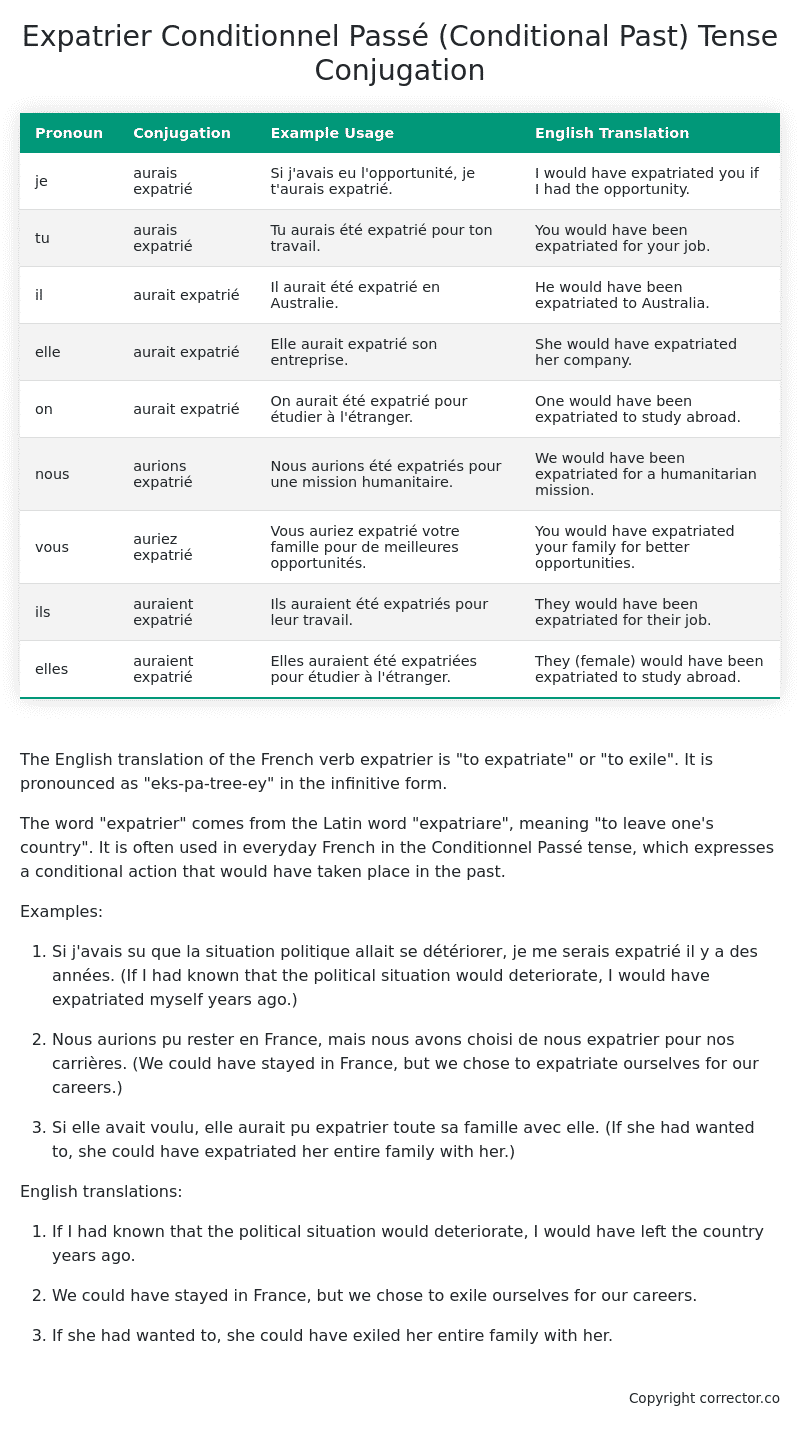Conditionnel Passé (Conditional Past) Tense Conjugation of the French Verb expatrier
Introduction to the verb expatrier
The English translation of the French verb expatrier is “to expatriate” or “to exile”. It is pronounced as “eks-pa-tree-ey” in the infinitive form.
The word “expatrier” comes from the Latin word “expatriare”, meaning “to leave one’s country”. It is often used in everyday French in the Conditionnel Passé tense, which expresses a conditional action that would have taken place in the past.
Examples:
-
Si j’avais su que la situation politique allait se détériorer, je me serais expatrié il y a des années. (If I had known that the political situation would deteriorate, I would have expatriated myself years ago.)
-
Nous aurions pu rester en France, mais nous avons choisi de nous expatrier pour nos carrières. (We could have stayed in France, but we chose to expatriate ourselves for our careers.)
-
Si elle avait voulu, elle aurait pu expatrier toute sa famille avec elle. (If she had wanted to, she could have expatriated her entire family with her.)
English translations:
-
If I had known that the political situation would deteriorate, I would have left the country years ago.
-
We could have stayed in France, but we chose to exile ourselves for our careers.
-
If she had wanted to, she could have exiled her entire family with her.
Table of the Conditionnel Passé (Conditional Past) Tense Conjugation of expatrier
| Pronoun | Conjugation | Example Usage | English Translation |
|---|---|---|---|
| je | aurais expatrié | Si j’avais eu l’opportunité, je t’aurais expatrié. | I would have expatriated you if I had the opportunity. |
| tu | aurais expatrié | Tu aurais été expatrié pour ton travail. | You would have been expatriated for your job. |
| il | aurait expatrié | Il aurait été expatrié en Australie. | He would have been expatriated to Australia. |
| elle | aurait expatrié | Elle aurait expatrié son entreprise. | She would have expatriated her company. |
| on | aurait expatrié | On aurait été expatrié pour étudier à l’étranger. | One would have been expatriated to study abroad. |
| nous | aurions expatrié | Nous aurions été expatriés pour une mission humanitaire. | We would have been expatriated for a humanitarian mission. |
| vous | auriez expatrié | Vous auriez expatrié votre famille pour de meilleures opportunités. | You would have expatriated your family for better opportunities. |
| ils | auraient expatrié | Ils auraient été expatriés pour leur travail. | They would have been expatriated for their job. |
| elles | auraient expatrié | Elles auraient été expatriées pour étudier à l’étranger. | They (female) would have been expatriated to study abroad. |
Other Conjugations for Expatrier.
Le Present (Present Tense) Conjugation of the French Verb expatrier
Imparfait (Imperfect) Tense Conjugation of the French Verb expatrier
Passé Simple (Simple Past) Tense Conjugation of the French Verb expatrier
Passé Composé (Present Perfect) Tense Conjugation of the French Verb expatrier
Futur Simple (Simple Future) Tense Conjugation of the French Verb expatrier
Futur Proche (Near Future) Tense Conjugation of the French Verb expatrier
Plus-que-parfait (Pluperfect) Tense Conjugation of the French Verb expatrier
Passé Antérieur (Past Anterior) Tense Conjugation of the French Verb expatrier
Futur Antérieur (Future Anterior) Tense Conjugation of the French Verb expatrier
Subjonctif Présent (Subjunctive Present) Tense Conjugation of the French Verb expatrier
Subjonctif Passé (Subjunctive Past) Tense Conjugation of the French Verb expatrier
Subjonctif Imparfait (Subjunctive Imperfect) Tense Conjugation of the French Verb expatrier
Subjonctif Plus-que-parfait (Subjunctive Pluperfect) Tense Conjugation of the French Verb expatrier
Conditionnel Présent (Conditional Present) Tense Conjugation of the French Verb expatrier
Conditionnel Passé (Conditional Past) Tense Conjugation of the French Verb expatrier (this article)
L’impératif Présent (Imperative Present) Tense Conjugation of the French Verb expatrier
L’infinitif Présent (Infinitive Present) Tense Conjugation of the French Verb expatrier
Struggling with French verbs or the language in general? Why not use our free French Grammar Checker – no registration required!
Get a FREE Download Study Sheet of this Conjugation 🔥
Simply right click the image below, click “save image” and get your free reference for the expatrier Conditionnel Passé tense conjugation!

Expatrier – About the French Conditionnel Passé (Conditional Past) Tense
Formation
Common Everyday Usage Patterns
Expressing Unreal Past Scenarios
Polite Requests or Suggestions
Expressing Doubt or Uncertainty
Interactions with Other Tenses
Conditional Present
Indicative Past Tenses
Conditional Future
Summary
Want More?
I hope you enjoyed this article on the verb expatrier. Still in a learning mood? Check out another TOTALLY random French verb conjugation!


